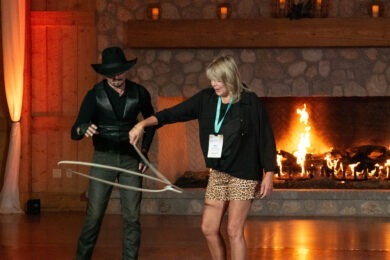Political discussions can turn ugly when people meet. Here’s how to keep your meeting neutral in a Red State/Blue State world.
Even in the best of times, political discussions are not always the grease you want in a meetings’ wheels. In today’s hot-button–issue climate, political discussions can easily flame into arguments, something that can diminish an event’s atmosphere, create bad will and shift the focus from a meetings’ issues at hand.
How can meeting planners steer participants away from political arguments or discussions or, at best, make sure that such discussions are collegial and don’t take attention away from the reason the group is meeting in the first place?
Staying Civil
Christopher Kirbabas, director of programs, Society of Architectural Historians (SAH), says, “SAH neither encourages nor discourages conference participants from discussing political topics, but we do expect those conversations to be respectful of all points of view.”
He added, “We do send all conference attendees the link to our SAH Personal Conduct Policy and it does include text about discrimination of any form including political affiliation.”
Michael Dalton, senior vice president strategy, LEO Events, says the goal is to “bring people together.”
Embrace Neutrality
“We stay focused on the event’s tactical objectives. Even in a less-charged atmosphere than today’s, current events and breaking news are usually polarizing, fraught and impertinent to the experiences we set out to design—which are inherently uplifting and politically neutral. We provide opportunities for connection. We look for ways and places to add additional visibility and volume to inspiring ideas, and we continue to celebrate the people making positive contributions.”
Stay Focused
Jack Johnson chief advocacy officer, Destinations International, remembers on a trip many years ago to England: “The travel guide I read said to avoid talking politics or religion in pubs. And yet, when I went into pubs it seems like that was all they wanted to talk about. And it seemed safer than talking about football (U.S. soccer).”
“My advice to meeting planners is to have a very clear agenda for the meeting and stick to it,” Johnson says. “Avoid going off-topic, especially if it involves political discussions. If someone brings up a political topic, politely redirect the conversation back to the agenda.
“However, if politics is to be discussed, remember that respect for each other is key. Encourage everyone in the meeting to listen to each other and express their opinions respectfully. Someone should act as a neutral moderator so that if someone starts to get heated or hostile, remind them of the ground rules and ask them to refocus on the agenda.
“Finally, and perhaps most important, people need to understand that everything we know in this world falls into three buckets: Things known to be true; things known to be false; and things not yet proved false (theories that are often taken as truth until proven otherwise). That last bucket is the largest. People need to understand that in all our arguments there are a small number of facts and a lot of opinions, beliefs and theories that may be true but still might not be. That is why respect for each other is so important and why even if you disagree with someone, you need to carefully listen to everything that is said and separate those things known to be false and those things not proven false and concentrate on those. That is where interesting conversations are had, and learning can happen.”
Some other points to consider include:
1. Hold a space apart for politics
If a major election or other political event is on participants’ radar, consider having a delegated media room where meeting goers can check in with results. The separate space encourages keeping the issue apart from the meetings’ major focus and allows planners to encourage participants to keep discussions limited to that area.
2. Diffuse or lose.
If a Q&A with speakers covers or includes areas of “hot-button” political views, make sure speakers have a “diffuse” strategy statement. “Thank you for your opinion, we value your ideas but let’s keep our focus on XY or X.”
3. Put politics into perspective.
Consider the mix of your meeting in a regional context. If your meeting is in a state that is currently in the news for a political issue, think about asking participants to keep out certain topics beyond the limits of the meeting and make that statement at the beginning of the event.
Read More: The Weaponization of Travel
With some mindfulness and forethought, politics and hot-button issues need not separate and alienate meeting-goers and their hosts.




